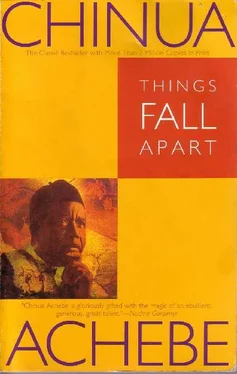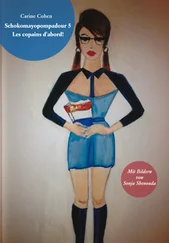Chinua Achebe - Things Fall Apart
Здесь есть возможность читать онлайн «Chinua Achebe - Things Fall Apart» весь текст электронной книги совершенно бесплатно (целиком полную версию без сокращений). В некоторых случаях можно слушать аудио, скачать через торрент в формате fb2 и присутствует краткое содержание. Город: New York, Год выпуска: 1994, Издательство: A DIVISION OF RANDOM HOUSE, INC., Жанр: Контркультура, на английском языке. Описание произведения, (предисловие) а так же отзывы посетителей доступны на портале библиотеки ЛибКат.
- Название:Things Fall Apart
- Автор:
- Издательство:A DIVISION OF RANDOM HOUSE, INC.
- Жанр:
- Год:1994
- Город:New York
- ISBN:нет данных
- Рейтинг книги:2 / 5. Голосов: 2
-
Избранное:Добавить в избранное
- Отзывы:
-
Ваша оценка:
- 40
- 1
- 2
- 3
- 4
- 5
Things Fall Apart: краткое содержание, описание и аннотация
Предлагаем к чтению аннотацию, описание, краткое содержание или предисловие (зависит от того, что написал сам автор книги «Things Fall Apart»). Если вы не нашли необходимую информацию о книге — напишите в комментариях, мы постараемся отыскать её.
—W. B. Yeats, "The Second Coming"
Things Fall Apart — читать онлайн бесплатно полную книгу (весь текст) целиком
Ниже представлен текст книги, разбитый по страницам. Система сохранения места последней прочитанной страницы, позволяет с удобством читать онлайн бесплатно книгу «Things Fall Apart», без необходимости каждый раз заново искать на чём Вы остановились. Поставьте закладку, и сможете в любой момент перейти на страницу, на которой закончили чтение.
Интервал:
Закладка:
"That wine is the work of a good tapper," said Okonkwo.
The young suitor, whose name was Ibe, smiled broadly and said to his father: "Do you hear that?" He then said to the others: "He will never admit that I am a good tapper."
"He tapped three of my best palm trees to death," said his father, Ukegbu.
"That was about five years ago," said Ibe, who had begun to pour out the wine, "before 1 learned how to tap." He filled the first horn and gave to his father. Then he poured out for the others. Okonkwo brought out lьs big horn from the goatskin bag, blew into it to remove any dust that might be there, and gave it to Ibe to fill.
As the men drank, they talked about everything except the thing for which they had gathered. It was only after the pot had been emptied that the suitor's father cleared his voice and announced the object of their visit.
Obierika then presented to him a small bundle of short broomsticks. Ukegbu counted them. "They are thirty?" he asked. Obierika nodded in agreement.
"We are at last getting somewhere," Ukegbu said, and then turning to his brother and his son he said: "Let us go out and whisper together." The three rose and went outside. When they returned Ukegbu handed the bundle of sticks back to Obierika. He counted them,– instead of thirty there were now only fifteen. He passed them over to his eldest brother, Machi, who also counted them and said:
"We had not thought to go below thirty. But as the dog said, 'If I fall down for you and you fall down for me, it is play'. Marriage should be a play and not a fight/ so we are I ailing down again." He then added ten sticks to the fifteen and gave the bundle to Ukegbu.
In this way Akuke's bride-price was finally settled at twenty bags of cowries. It was already dusk when the two parties came to this agreement.
"Go and tell Akueke's mother that we have finished," Obierika said to his son, Maduka. Almost immediately the women came in with a big bowl of foo-foo. Obierika's second wife followed with a pot of soup, and Maduka brought in a pot of palm-wine.
As the men ate and drank palm-wine they talked about the customs of their neighbors.
"It was only this morning," said Obierika, "that Okonkwo and I were talking about Abame and Aninta, where titled men climb trees and pound foo-foo for their wives."
"All their customs are upside-down. They do not decide bride-price as we do, with sticks. They haggle and bargain as if they were buying a goat or a cow in the market."
"That is very bad," said Obierika's eldest brother. "But what is good in one place is bad in another place. In Umunso they do not bargain at all, not even with broomsticks. The suitor just goes on bringing bags of cowries until his in-laws tell him to stop. It is a bad custom because it always leads to a quarrel."
"The world is large," said Okonkwo. "I have even heard that in some tribes a man's children belong to his wife and her family."
"That cannot be," said Machi. "You might as well say that the woman lies on top of the man when they are making the children."
"It is like the story of white men who, they say, are white like this piece of chalk," said Obierika. He held up a piece of chalk, which every man kept in his obi and with which his guests drew lines on the floor before they ate kola nuts. "And these white men, they say, have no toes."
"And have you never seen them?" asked Machi.
"Have you?" asked Obierika.
"One of them passes here frequently," said Machi. "His name is Amadi."
Those who knew Amadi laughed. He was a leper, and the polite name for leprosy was "the white skin."
CHAPTER NINE
For the first time in three nights, Okonkwo ^«"-^"sv/-"; slept. He woke up once in the middle of the night and his mind went back to the past three days without making him feel uneasy. He began to wonder why he had felt uneasy at all. It was like a man wondering in broad daylight why a dream had appeared so terrible to him at night. He stretched himself and scratched his thigh where a mosquito had bitten him as he slept. Another one was wailing near his right ear. He slapped the ear and hoped he had killed it. Why do they always go for one's ears? When he was a child his mother had told him a story about it. But it was as silly as all women's stories. Mosquito, she had said, had asked Ear to marry him, whereupon Ear fell on the floor in uncontrollable laughter. "How much longer do you think you will live?" she asked. "You are already a skeleton." Mosquito went away humiliated, and any time he passed her way he told Ear that he was still alive.
Okonkwo turned on his side and went back to sleep. He was roused in the morning by someone banging on his door.
"Who is that?" he growled. He knew it must be Ekwefi.
Of his three wives Ekwefi was the only one who would have the audacity to bang on his door.
"Ezinma is dying," came her voice, and all the tragedy and sorrow of her life were packed in those words.
Okonkwo sprang from his bed, pushed back the bolt on his door and ran into Ekwefi's hut.
Ezinma lay shivering on a mat beside a huge fire that her mother had kept burning all night.
"It is iba ," said Okonkwo as he took his machete and went into the bush to collect the leaves and grasses and barks of trees that went into making the medicine for iba .
Ekwefi knelt beside the sick child, occasionally feeling with her palm the wet, burning forehead.
Ezinma was an only child and the center of her mother's world. Very often it was Ezinma who decided what food her mother should prepare. Ekwefi even gave her such delicacies as eggs, which children were rarely allowed to eat because such food tempted them to steal. One day as Ezinma was eating an egg Okonkwo had come in unexpectedly from his hut. He was greatly shocked and swore to beat Ekwefi if she dared to give the child eggs again. But it was impossible to refuse Ezinma anything. After her father's rebuke she developed an even keener appetite for eggs. And she enjoyed above all the secrecy in which she now ate them. Her mother always took her into their bedroom and shut the door.
Ezinma did not call her mother Nne like all children. She called her by her name, Ekwefi, as her father and other grownup people did. The relationship between them was not only that of mother and child. There was something in it like the companionship of equals, which was strengthened by such little conspiracies as eating eggs in the bedroom.
Ekwefi had suffered a good deal in her life. She had borne ten children and nine of them had died in infancy, usually before the age of three. As she buried one child after another her sorrow gave way to despair and then to grim resignation. The birth of her children, which should be a woman's crowning glory, became for Ekwefi mere physical agony devoid of promise. The naming ceremony after seven market weeks became an empty ritual. Her deepening despair found expression in the names she gave her children. One of them was a pathetic cry, Onwumbiko—"Death, I implore you." But Death took no notice,– Onwumbiko died in his fifteenth month. The next child was a girl, Ozoemena—"May it not happen again." She died in her eleventh month, and two others after her. Ekwefi then became defiant and called her next child Onwuma—"Death may please himself." And he did.
After the death of Ekwefi's second child, Okonkwo had gone to a medicine man, who was also a diviner of the Afa Oracle, to inquire what was amiss. This man told him that the child was an ocjbcmje , one of those wicked children who, when they died, entered their mothers' wombs to be born again.
"When your wife becomes pregnant again," he said, "let her not sleep in her hut. Let her go and stay with her people. In that way she will elude her wicked tormentor and break its evil cycle of birth and death."
Читать дальшеИнтервал:
Закладка:
Похожие книги на «Things Fall Apart»
Представляем Вашему вниманию похожие книги на «Things Fall Apart» списком для выбора. Мы отобрали схожую по названию и смыслу литературу в надежде предоставить читателям больше вариантов отыскать новые, интересные, ещё непрочитанные произведения.
Обсуждение, отзывы о книге «Things Fall Apart» и просто собственные мнения читателей. Оставьте ваши комментарии, напишите, что Вы думаете о произведении, его смысле или главных героях. Укажите что конкретно понравилось, а что нет, и почему Вы так считаете.












